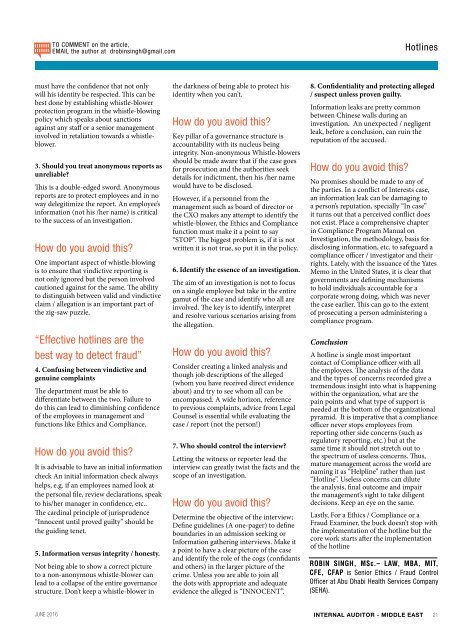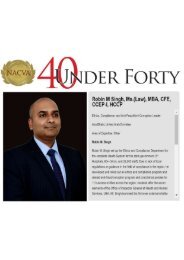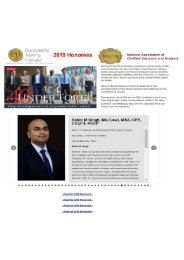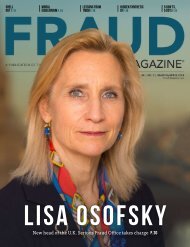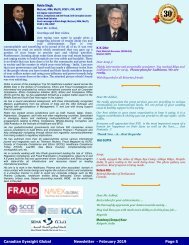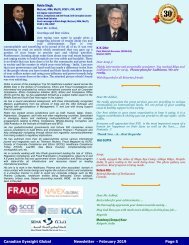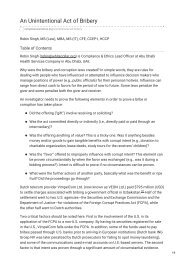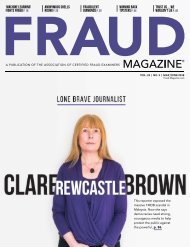Effective Whistle-blowing Hotlines by Robin Singh
Hotline pitfalls and solutions from the implementation stage to the commencement of an investigation. By #RobinSingh
Hotline pitfalls and solutions from the implementation stage to the commencement of an investigation. By #RobinSingh
You also want an ePaper? Increase the reach of your titles
YUMPU automatically turns print PDFs into web optimized ePapers that Google loves.
TO COMMENT on the article,<br />
EMAIL the author at drobinsingh@gmail.com<br />
<strong>Hotlines</strong><br />
must have the confidence that not only<br />
will his identity be respected. This can be<br />
best done <strong>by</strong> establishing whistle-blower<br />
protection program in the whistle-<strong>blowing</strong><br />
policy which speaks about sanctions<br />
against any staff or a senior management<br />
involved in retaliation towards a whistleblower.<br />
3. Should you treat anonymous reports as<br />
unreliable?<br />
This is a double-edged sword. Anonymous<br />
reports are to protect employees and in no<br />
way delegitimize the report. An employee’s<br />
information (not his /her name) is critical<br />
to the success of an investigation.<br />
How do you avoid this?<br />
One important aspect of whistle-<strong>blowing</strong><br />
is to ensure that vindictive reporting is<br />
not only ignored but the person involved<br />
cautioned against for the same. The ability<br />
to distinguish between valid and vindictive<br />
claim / allegation is an important part of<br />
the zig-saw puzzle.<br />
“<strong>Effective</strong> hotlines are the<br />
best way to detect fraud”<br />
4. Confusing between vindictive and<br />
genuine complaints<br />
The department must be able to<br />
differentiate between the two. Failure to<br />
do this can lead to diminishing confidence<br />
of the employees in management and<br />
functions like Ethics and Compliance.<br />
How do you avoid this?<br />
It is advisable to have an initial information<br />
check An initial information check always<br />
helps, e.g. if an employees named look at<br />
the personal file, review declarations, speak<br />
to his/her manager in confidence, etc..<br />
The cardinal principle of jurisprudence<br />
“Innocent until proved guilty” should be<br />
the guiding tenet.<br />
5. Information versus integrity / honesty.<br />
Not being able to show a correct picture<br />
to a non-anonymous whistle-blower can<br />
lead to a collapse of the entire governance<br />
structure. Don’t keep a whistle-blower in<br />
the darkness of being able to protect his<br />
identity when you can’t.<br />
How do you avoid this?<br />
Key pillar of a governance structure is<br />
accountability with its nucleus being<br />
integrity. Non-anonymous <strong>Whistle</strong>-blowers<br />
should be made aware that if the case goes<br />
for prosecution and the authorities seek<br />
details for indictment, then his /her name<br />
would have to be disclosed.<br />
However, if a personnel from the<br />
management such as board of director or<br />
the CXO makes any attempt to identify the<br />
whistle-blower, the Ethics and Compliance<br />
function must make it a point to say<br />
“STOP”. The biggest problem is, if it is not<br />
written it is not true, so put it in the policy.<br />
6. Identify the essence of an investigation.<br />
The aim of an investigation is not to focus<br />
on a single employee but take in the entire<br />
gamut of the case and identify who all are<br />
involved. The key is to identify, interpret<br />
and resolve various scenarios arising from<br />
the allegation.<br />
How do you avoid this?<br />
Consider creating a linked analysis and<br />
though job descriptions of the alleged<br />
(whom you have received direct evidence<br />
about) and try to see whom all can be<br />
encompassed. A wide horizon, reference<br />
to previous complaints, advice from Legal<br />
Counsel is essential while evaluating the<br />
case / report (not the person!)<br />
7. Who should control the interview?<br />
Letting the witness or reporter lead the<br />
interview can greatly twist the facts and the<br />
scope of an investigation.<br />
How do you avoid this?<br />
Determine the objective of the interview;<br />
Define guidelines (A one-pager) to define<br />
boundaries in an admission seeking or<br />
Information gathering interviews. Make it<br />
a point to have a clear picture of the case<br />
and identify the role of the cogs (confidants<br />
and others) in the larger picture of the<br />
crime. Unless you are able to join all<br />
the dots with appropriate and adequate<br />
evidence the alleged is “INNOCENT”.<br />
8. Confidentiality and protecting alleged<br />
/ suspect unless proven guilty.<br />
Information leaks are pretty common<br />
between Chinese walls during an<br />
investigation. An unexpected / negligent<br />
leak, before a conclusion, can ruin the<br />
reputation of the accused.<br />
How do you avoid this?<br />
No promises should be made to any of<br />
the parties. In a conflict of Interests case,<br />
an information leak can be damaging to<br />
a person’s reputation, specially “In case”<br />
it turns out that a perceived conflict does<br />
not exist. Place a comprehensive chapter<br />
in Compliance Program Manual on<br />
Investigation, the methodology, basis for<br />
disclosing information, etc. to safeguard a<br />
compliance officer / investigator and their<br />
rights. Lately, with the issuance of the Yates<br />
Memo in the United States, it is clear that<br />
governments are defining mechanisms<br />
to hold individuals accountable for a<br />
corporate wrong doing, which was never<br />
the case earlier. This can go to the extent<br />
of prosecuting a person administering a<br />
compliance program.<br />
Conclusion<br />
A hotline is single most important<br />
contact of Compliance officer with all<br />
the employees. The analysis of the data<br />
and the types of concerns recorded give a<br />
tremendous insight into what is happening<br />
within the organization, what are the<br />
pain points and what type of support is<br />
needed at the bottom of the organizational<br />
pyramid. It is imperative that a compliance<br />
officer never stops employees from<br />
reporting other side concerns (such as<br />
regulatory reporting, etc.) but at the<br />
same time it should not stretch out to<br />
the spectrum of useless concerns. Thus,<br />
mature management across the world are<br />
naming it as “Helpline” rather than just<br />
“Hotline”. Useless concerns can dilute<br />
the analysis, final outcome and impair<br />
the management’s sight to take diligent<br />
decisions. Keep an eye on the same.<br />
Lastly, For a Ethics / Compliance or a<br />
Fraud Examiner, the buck doesn’t stop with<br />
the implementation of the hotline but the<br />
core work starts after the implementation<br />
of the hotline<br />
ROBIN SINGH, MSc.– LAW, MBA, MIT,<br />
CFE, CFAP is Senior Ethics / Fraud Control<br />
Officer at Abu Dhabi Health Services Company<br />
(SEHA).<br />
JUNE 2016<br />
INTERNAL AUDITOR - MIDDLE EAST 21


